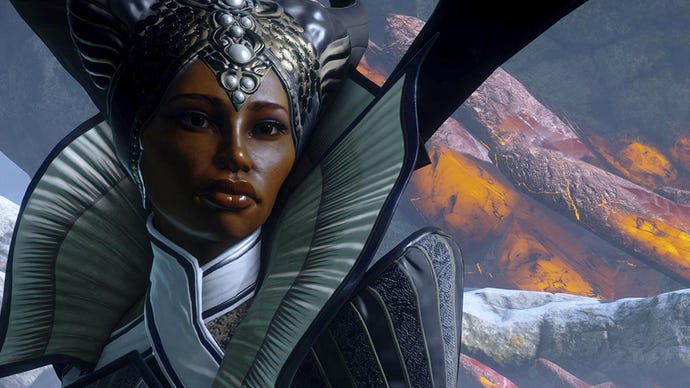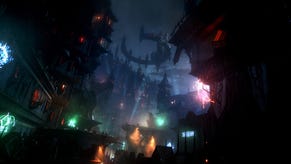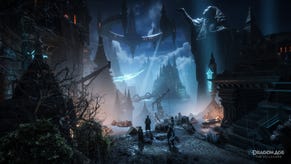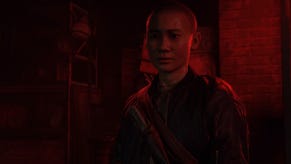Dragon Age: Inquisition's story may be more complicated than you think
In Dragon Age: Inquisition, the Templars are bad and the mages need to be liberated from their oppression, right? Well, maybe. It's all a bit complicated.
Dragon Age: Inquisition perfectly highlights many of the things I love about the franchise: complex moral issues, many shades of grey, characters with independent motivations. I'm one of those players who explores every investigative branch of a dialogue tree before committing to an answer; who reads the codex; and who thinks carefully about the consequences and their character's personality to date before making decisions.
I appreciate that not everybody is as invested as me, and that even those who are won't have the same interpretation of events and characters as I do - even assuming they made all the same choices, which they won't, because Dragon Age is wonderful. But there's one particular aspect of Dragon Age: Inquisition's plot to date that I've found really splits opinions, and mostly that split seems to be me in one camp and everyone else in the other. That issue is whether the Circles ought to exist; I think they should.
I'm not very far into Inquisition yet, so my opinions may change dramatically, but at this point my sympathies are very much with the mages - as they have been throughout the Dragon Age series to date. The abuses mages have suffered at the hands of Templars are unforgivable, and as in the real world, have too often just been swept under the carpet.
And yet: I don't believe the Circles themselves are necessarily a bad thing, or that the mage rebels are in the right with their war on the Templars. And this is an unpopular opinion, apparently. Here's my friend Mythor bagging me out on twitter for having Vivienne, a Circle mage, in my party:
I'm on a little Twitter break at present due to incapacity to cope with the sadness of the world, so you can't see my replies, but basically I came out swinging for voluntary Circle membership.
Then, this morning, I was chatting to a friend of mine about role playing and connecting with your Inquisitor. In our discussion, she brought up the Circles:
In my chats with my friends, and then a bit of poking around elsewhere, I've realised a lot of Dragon Age fans see the issue of the Circles in black and white. This seems like a real shame to me, because as I said above, one of the beauties of Dragon Age (to a much greater degree than Mass Effect) is that there are so many shades of grey. Even when an issue seems straightforward, a later conversation or event can cast it into doubt; your character never knows precisely what's going on, and other characters have their own agendas to push.
I think talking about the Circles is a really good illustration of how much more subtle and nuanced the story of Inquisition is, so let's do that.
First, let's pause for a bit of lore; skip down past the next image if, like me, you're a Dragon Age tragic and know it all backwards and forwards. The world of Dragon Age is split into two realms - the mundane and the Fade. The Fade is the source of magic, but also dreaming, emotion and imaginations; everyone has a connection to the Fade, and if that connection is severed, as when a mage is made Tranquil, they lose certain aspects of their personality. Mages are people who can, at will and with their own power, penetrate the Veil, the barrier that keeps the two realms apart. They do this in order to channel power for various spells or even cross over to explore.
But the Fade has its own inhabitants, and making holes in the Veil, however small, risks drawing their attention. Although the denizens of the Veil are not inherently evil (talk to Solas in Haven for more details on this, or see: the entire Anders arc), the ones who wander through the Veil almost always turn out to be hostile; these are the demons and spirits you fight throughout the game.
Powerful, well-trained mages can defend themselves against demons, but even with staunch protections there's always a risk that a spirit of the Fade will overcome and possess them, turning them into what's called an Abomination. Abominations can wreak untold havoc, and it is for this reason, as well as the very human distrust of the different and powerful, that mages are feared throughout the world.
The Circles are also home to Templars, warriors imbued with magical powers that equip them to fight demons and Abominations – as well as rogue mages, such as those who use the forbidden blood magic or refuse to join a Circle, thus rendering themselves Apostates.
In the culture common to Ferelden, Orlais and the Free Marches, mages are required to register and train with a Circle. The Circles are also home to Templars, warriors imbued with magical powers that equip them to fight demons and Abominations - as well as rogue mages, such as those who use the forbidden blood magic or refuse to join a Circle, thus rendering themselves Apostates. Mages who register with circles give up a Phylactery which allows the Templars of their Circle to track them down if they go missing. These Circles are ultimately administered by the Chantry, a multi-national religious organisation, but each is led by a First Enchanter and a Templar leader.
Now for a bit of backstory. During the events of Dragon Age: Origins and Dragon Age 2, the player has several encounters with Templars and mages, each time being made aware of the tensions between the two groups. In Origins, there's a quest which suggests the mages are unhappy with their confinement and suffer abuse at the hands of the Templars. In Dragon Age 2 the mage-Templar relationship is a central theme of the game; Hawke's father was an Apostate, as is either Hawke or a sibling, and the local Templar leader is an unmitigated villain, causing great harm to the mages in the local circle. At the end of Dragon Age 2, a small group of mages takes extreme action against the Chantry in the form of an act of terrorism, hoping to trigger a rebellion against Templar and Chantry control. They are successful.
So now here we are in Dragon Age: Inquisition. The Templars and mages are at war and Thedas is being torn apart by their conflict. The Chantry makes a bid to restore peace by organising a parley, but something goes terribly wrong - an enormous breach appears in the sky allowing Fade spirits to pour though, and you are thrown into the middle of it all, and must work to restore order to the chaos by uniting various factions to your cause.
At the end of Dragon Age 2, I was appalled at what the mages had done in an attempt to free themselves from Chantry and Templar control - but painfully aware that other means of freeing the oppressed Kirkwall Circle from abusive Templars had been unsuccessful to date. Talking to my friends, I was surprised to learn that many of them had no sympathy for Anders and his group at all. That's a whole other discussion, but the ending of Dragon Age 2 is important because of what happened afterwards.
What you're told in main quest text and cutscenes is that the mages rebelled against the Chantry and have gone to war with the Templar order all over Thedas. Despite your potential disgust at Anders's act, you see the Templar jackboot and you react against it: mages should be free.
And indeed they should; I agree. I believe mages should self-govern, and be free to come and go. The thing is: many of them were, even before the rebellion, and loads of them are desperately unhappy at being drawn into a war with consequences for the whole of Thedas.
It takes only a few minutes to find this out, if you're motivated. Talk to Vivienne when you first meet her and later in Haven, exploring all her dialogue options. She tells you a great deal that isn't made clear if you don't spend time talking, notably that the mage vote to rebel against the Chantry was an almost even split, and that Grand Enchanter Fiona ruled in favour of rebellion without the full support of the Circles.
Vivienne was a First Enchanter in her circle, so of course she has power and privilege, and a vested interest in maintaining the status quo, which may colour her perception and depiction of Circle life. But hers isn’t the only voice in favour of Circles.
Vivienne also describes life in a Circle, beginning by saying that every Circle is different - and that every Templar is different, too. We already know some Circles were disgusting, oppressive, abusive places, and I'm sure we all agree the other First Enchanters, the Templar order and the Chantry should never have allowed that to happen. But after talking to Vivienne, I now know that many others were great places to live. Mages had the company of their own kind, as well as Templars, who didn't fear them but respected them for their gifts and learning. They has access to all the study materials they needed. They could come and go at will, maintaining homes and lives outside the Circle, with permission from their First Enchanter (presumably withheld from those whose training is not yet advanced enough to safeguard them from possession). In this way, the mages were self-governing; they decided who had to remain in their towers, and who could safely wander free. As with any authority this would have been open to corruption and abuse, but it's a very different picture from the mandatory Templar-run prisons the Circles are depicted as elsewhere.
Vivienne was the First Enchanter of her Circle, with a good chance at becoming Grand Enchanter in Fiona's place, so of course she has power and privilege, and a vested interest in maintaining the status quo, which may colour her perception and depiction of Circle life. But hers isn't the only voice in favour of Circles. If you wander around Redcliffe prior to the big decision to side with the Templars or Mages, you can talk to numerous mages who don't want to be part of the rebellion but felt they had nowhere else to go once the Circles fell. There's a great example in Haven, too. Visit Joesphine's office and really talk to the researcher there; she just wants to go back to her quiet Circle and never leave.
The Chantry's Circles certainly weren't perfect, and there are a lot of reasons why the Templar-mage relationship was problematic and needed interrogation. The business of Phylacteries, and mandatory membership in a Circle, is an affront to liberty. Templars being left unsupervised to oppress mages shows the system had far too many flaws and needed an overhaul.
But the Circles weren't inherently evil in and of themselves, and mages who want them restored, or who argued for more mild action in response to the Kirkwall incident, aren't necessarily evil slavers or brainwashed victims.
I'm almost certain that if I had spent time talking to the Templars, I would have discovered similar nuance on their side of the battle; the fact that Cullen, a Templar to the bone, has joined the Inquisition shows they're not a homogenous group either. Just like every issue in Dragon Age, if you investigate you'll find there are two sides to the story - if not many, many more. That's one of the franchise's greatest strengths.














